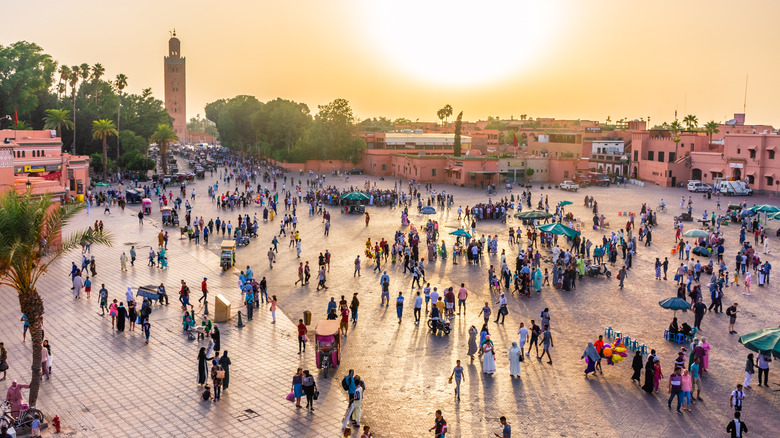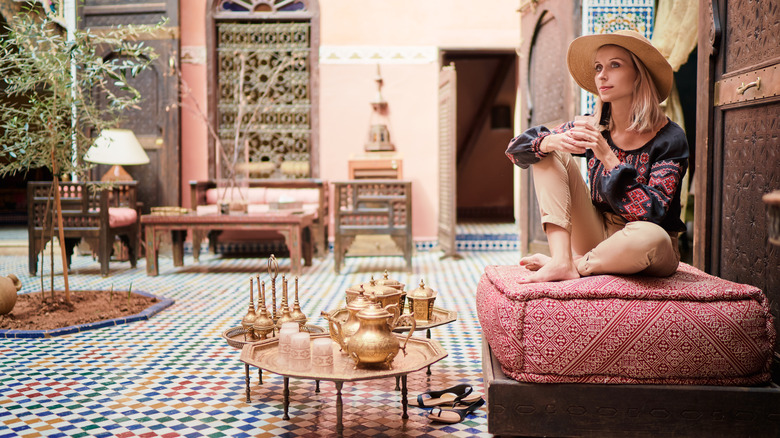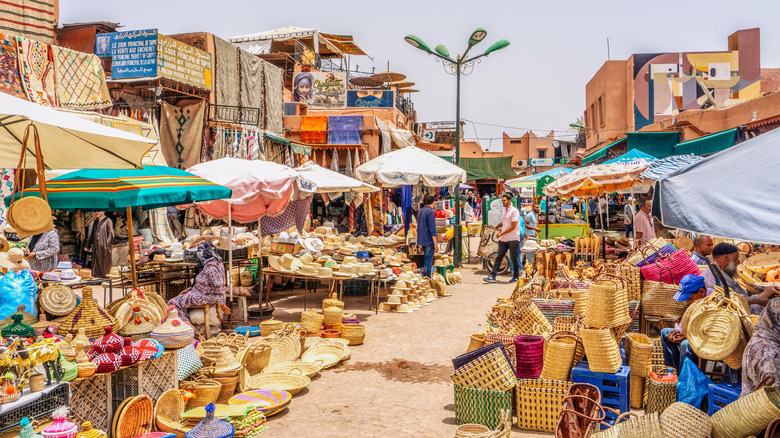What You Need To Be Aware Of As A Tourist Visiting Morocco
History buffs, architectural enthusiasts, outdoor adventurers, and those who prefer to dine and shop their way through a stay can agree that Morocco is a destination with something inspiring to offer. Here, unique cultural influences thrive in tandem while ancient imperial cities filled with aesthetic character are waiting to be explored. A trip this way makes it just as easy to enjoy time on scenic coastlines as it is to step into the vibrant heart of historic stops like Rabat, Fes, Chefchaouen, Meknes, and Marrakech.
Whether it's the bustling markets known as souks filled with carpets, lamps, and spices that draw you in, or you're excited to access the scenic Sahara, Morocco is truly a mesmerizing country. According to Morocco World News, the country's tourism office has implemented a plan referred to as "Light in Action" that's designed to attract over 17 million visitors to Morocco by 2026. The same report saw Morocco welcoming nearly 3 million tourists in the first quarter of 2023 alone.
When you find yourself with travel plans to visit Morocco, it's essential to understand that travel etiquette here is very much intertwined with religious and cultural expectations. A recent report on international religious freedom carried out by the U.S. State Department estimates more than 99% of the population in Morocco identify as Sunni Muslims. Understanding this conservative country's norms will help you plan appropriately, especially when you intend to visit mosques or spend time in busy markets.
Clothing expectations, greetings, and languages
Within Muslim societies, women are expected to dress more conservatively. It's advisable for female tourists to dress modestly too in Morocco out of respect for cultural norms, and to avoid any tension in public or religious places. Having a headscarf at all times is a good idea, especially when visiting mosques or being invited into someone's home. Loose-fitting clothing covering most of the arms and legs is always recommended as well.
As a tourist in Morocco, you'll want to be sure that when you're shaking someone's hand, presenting a gift, or eating, you're doing so with your right hand exclusively. The left hand is considered strictly unclean in Morocco. Using your left hand to drink tea or greet someone is considered rude.
It's equally important for tourists to know that they must always remove their shoes in religious establishments and private homes. Make sure you have clean socks handy upon entering these places. It's a clear sign of cultural understanding and respect.
Anytime you travel, learning a few traditional greetings in the official language is always a good idea. It shows residents that you make an effort to understand and participate in the culture. In Morocco, you'll encounter Arabic, Berber, and French speakers. While many people speak English in larger cities, this isn't the case in rural areas so attempting greetings in the local language is bound to impress.
Consider currency, haggling, and holidays
Being a considerate tourist in Morocco means understanding how you'll pay for items you purchase. While shops in larger cities typically take credit cards, most street vendors, small market stands, and cabs accept local currency (dirhams). It's also a good idea to keep plenty of change readily available as opposed to larger bills. It's not uncommon to encounter claims by cab drivers and street vendors that they simply can't make change for you. When this happens, you'll be drastically overspending on just about everything.
While some tourists in Morocco are hesitant to try based on their own cultural notions, it's good to know that it isn't considered rude at all to haggle in the marketplaces you visit. In fact, many Moroccans consider this an admirable cultural skill. If you find that you're a natural at it, you might just save a lot on souvenirs too. Efficient haggling takes patience and an understanding of what you're willing to pay before you start. Doing a little research on the price of items you're interested in before entering the souk is always smart.
Finally, do pay extra special attention to your travel plans in Morocco on Fridays. This is a day set aside by many practicing Muslims as a holy day when storefronts and tourist attractions are closed. If you travel to Morocco over Eid Al Adha, be aware that in addition to public prayers, there are likely to be animal sacrifices happening in adherence to Islamic law.


